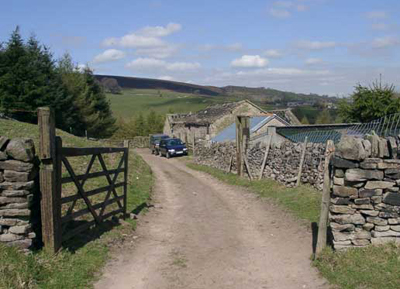Top ten loves and hates on country estates
The privilege of owning a country estate affords many joys – and a few frustrations. Arabella Youens finds out what owners really love and also love to hate.


10 things estate owners love
1. Having a lot of equity in their portfolio. ‘It makes it relatively easy and cheap to borrow money at the moment,' explains Philip Eddell of Savills' country-house consultancy
2. The eco-friendly future's bright for landowners. ‘Nearly all of the answers to global warming and global population growth are either local, land or natural resource based all things that estates are well placed to meet,' adds Mr Eddell
3. The pleasure to be derived from the continuity of ownership and open landlord and tenant relationships. ‘When you buy an estate, you often take on the "Lord of the manor" responsibilities, such as hosting the village fête or having the village cricket pitch on your grounds, and people like taking on that role,' says Mark McAndrew of Strutt & Parker's estates department
4. Grants that enable habitat management and repair funds for traditional farm buildings
5. The opportunity presented by future housing shortages
6. Farming. Knight Frank's latest research forecasts that farmland values are going to double in value in the next few years, possibly breaking the £10,000/acre barrier in 2015. ‘Plus, they're making 15% more this year on sub-sidies alone because the Euro was so strong on the day the European Central Bank fixed the exchange rate,' adds Andrew Shirley, head of research at Knight Frank
Sign up for the Country Life Newsletter
Exquisite houses, the beauty of Nature, and how to get the most from your life, straight to your inbox.
7. Income possibilities from alternative markets such as leisure, minerals, phone masts, restrictive covenants ‘and don't forget the film industry, which may want the house or the land for a location shoot,' points out Douglas Mackellar from Savills' office in Cheltenham
8. Country sports. ‘Landowners regard the pursuit of hunting, shooting and fishing and many other field sports as one of the most virtuous and supreme privileges of rural landownership,' believes Angus Harley of Knight Frank's rural consultancy. ‘Country sports are also linked closely to conservation and underpin the rural economy in many areas'
9. The cordon sanitaire of owning land around your property and the peace and quiet that comes from having a buffer against the outside world
10. Tax breaks such as Agricultural Property Relief, which means you can pass the farmland within the estate on to your children without them paying Inheritance Tax
* For more property features like this every week, subscribe and save
10 things estate owners hate
1. Litter, fly-tipping and a lack of respect for the countryside and rural environment
2. The unwieldy and expensive planning system ‘it lacks the flexibility to consider good planning solutions outside the norm,' says Mr Mackellar. ‘However,' adds Mr McAndrew, ‘if the house is Grade I listed, it means that planning consent has to go through English Heri-tage rather than just the local conservation officer-it's gene-rally much more knowledgeable and its approach is altogether more predictable'
3. The strange back-to-front approach to VAT (you pay it on repairs to listed buildings, but you receive a VAT discount for improvements to the same)
4. The latest active zealot from Defra, Natural England, the Forestry Commission or local authority who is only in place for two years before moving on. ‘I once had to deal with 16 different people from the Country-side Agency over a period of two years on behalf of one 1,000- acre estate,' complains Mr Eddell
5. The backside-covering approaches by local councils who insist on cutting down roadside trees ‘just in case'
6. Plans are afoot to extend the Countryside and Rights of Way Act (2000) to coastal areas, and it's long been thought that woodland is the next target. ‘Land-owners feel that the existing network is extensive and isn't fully utilised,' notes Mr Harley
7. The tome on Single Farm Payments that arrives twice a year. ‘It's utter madness: is it really practical to issue a telephone- directory-sized book to keep next to the sheep dip for reference?' asks Patrick Ramsay, head of residential at Knight Frank
8. Ignorant incomers-combine harvester drivers being berated for working on a Sunday and spoiling a weekender's peace and quiet, as if the farmer can control nature's timetable
9. Inflexibility of footpaths. ‘If a footpath can be diverted to a route with views and access that are as good, but avoids walkers going past someone's front door, who are the Ramblers' Association to dictate that this can't happen?' asks Mr Ramsay
10. Income volatility. ‘Everyone loves to call farmers and landowners rich, but they don't regard the land as something they'll sell,' believes Mr Ramsay. ‘They're actually very exposed to the volatility of commodity prices, and it's very stressful not knowing what you're going to earn from one year to the next'
* For more property features like this every week, subscribe and save
-
 'Monolithic, multi-layered and quite, quite magnificent. This was love at first bite': Tom Parker Bowles on his lifelong love affair with lasagne
'Monolithic, multi-layered and quite, quite magnificent. This was love at first bite': Tom Parker Bowles on his lifelong love affair with lasagneAn upwardly mobile spaghetti Bolognese, lasagne al forno, with oozing béchamel and layered meaty magnificence, is a bona fide comfort classic, declares Tom Parker Bowles.
By Tom Parker Bowles
-
 Country houses, cream teas and Baywatch: Country Life Quiz of the Day, April 24, 2025
Country houses, cream teas and Baywatch: Country Life Quiz of the Day, April 24, 2025Thursday's Quiz of the Day asks exactly how popular Baywatch became.
By Toby Keel